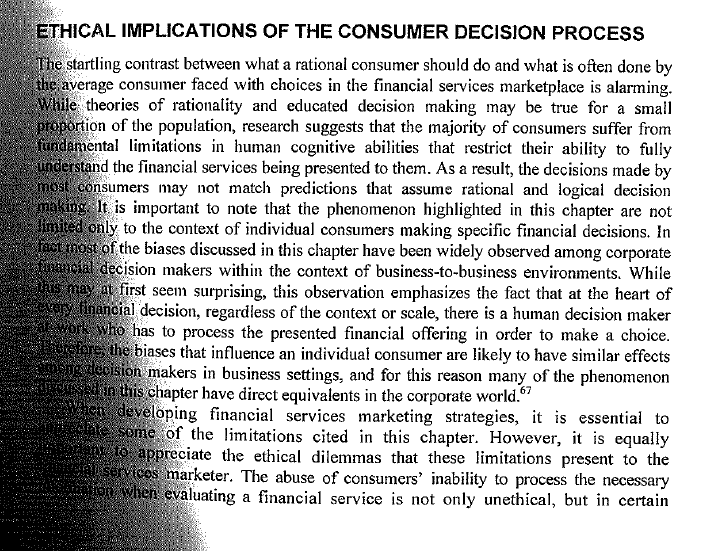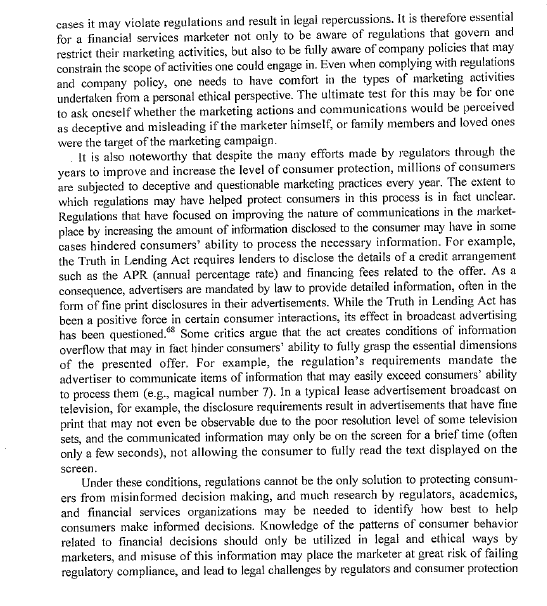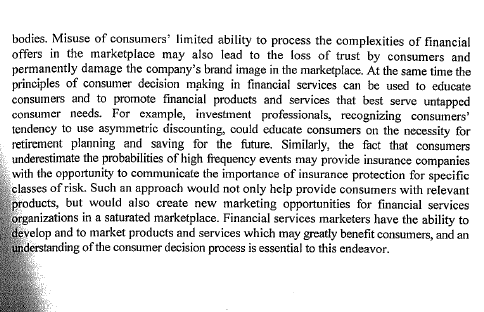Your Author writes on page 53 of your text, Marketing Financial Services: "When developing financial services marketing strategies, it is essential to appreciate some of the limitations cited in this chapter. However, it is equally important to appreciate the ethical dilemmas that these limitations present to the financial services marketer. The abuse of the consumers' inability to process the necessary information when evaluating a financial service is not only unethical, but in certain cases, it may violate regulations and result in legal repercussions. It is therefore essential for a financial services marketer not only to be aware of regulations that govern and restrict their marketing activities, but also to be fully aware of the company policies that may constrain the scope of activities one could engage in." Discuss.
ETHICAL IMPLICATIONS OF THE CONSUMER DECISION PROCESS The startling contrast between what a rational consumer should do and what is often done by the average consumer faced with choices in the financial services marketplace is alarming. While theories of rationality and educated decision making may be true for a small proportion of the population, research suggests that the majority of consumers suffer from fundamental limitations in human cognitive abilities that restrict their ability to fully inderstand the financial services being presented to them. As a result, the decisions made by at consumers may not match predictions that assume rational and logical decision inking. It is important to note that the phenomenon highlighted in this chapter are not imited only to the context of individual consumers making specific financial decisions. In act most of the biases discussed in this chapter have been widely observed among corporate il decision makers within the context of business-to-business environments. While y at first seem surprising, this observation emphasizes the fact that at the heart of financial decision, regardless of the context or scale, there is a human decision maker Who has to process the presented financial offering in order to make a choice fore the biases that influence an individual consumer are likely to have similar effects jailscision makers in business settings, and for this reason many of the phenomenon 31in this chapter have direct equivalents in the corporate world. ien developing financial services marketing strategies, it is essential to at some of the limitations cited in this chapter. However, it is equally it to appreciate the ethical dilemmas that these limitations present to the Services marketer. The abuse of consumers' inability to process the necessary in when evaluating a financial service is not only unethical, but in certaincases it may violate regulations and result in legal repercussions. It is therefore essential for a financial services marketer not only to be aware of regulations that govern and restrict their marketing activities, but also to be fully aware of company policies that may constrain the scope of activities one could engage in. Even when complying with regulations and company policy, one needs to have comfort in the types of marketing activities undertaken from a personal ethical perspective. The ultimate test for this may be for one to ask oneself whether the marketing actions and communications would be perceived as deceptive and misleading if the marketer himself, or family members and loved ones were the target of the marketing campaign. It is also noteworthy that despite the many efforts made by regulators through the years to improve and increase the level of consumer protection, millions of consumers are subjected to deceptive and questionable marketing practices every year. The extent to which regulations may have helped protect consumers in this process is in fact unclear. Regulations that have focused on improving the nature of communications in the market- place by increasing the amount of information disclosed to the consumer may have in some cases hindered consumers' ability to process the necessary information. For example, the Truth in Lending Act requires lenders to disclose the details of a credit arrangement such as the APR (annual percentage rate) and financing fees related to the offer. As a consequence, advertisers are mandated by law to provide detailed information, often in the form of fine print disclosures in their advertisements. While the Truth in Lending Act has been a positive force in certain consumer interactions, its effect in broadcast advertising has been questioned." Some critics argue that the act creates conditions of information overflow that may in fact hinder consumers' ability to fully grasp the essential dimensions of the presented offer. For example, the regulation's requirements mandate the advertiser to communicate items of information that may easily exceed consumers' ability to process them (e-g., magical number 7). In a typical lease advertisement broadcast on television, for example, the disclosure requirements result in advertisements that have fine print that may not even be observable due to the poor resolution level of some television sets, and the communicated information may only be on the screen for a brief time (often only a few seconds), not allowing the consumer to fully read the text displayed on the screen. Under these conditions, regulations cannot be the only solution to protecting consum- ers from misinformed decision making, and much research by regulators, academics, and financial services organizations may be needed to identify how best to help consumers make informed decisions. Knowledge of the patterns of consumer behavior related to financial decisions should only be utilized in legal and ethical ways by marketers, and misuse of this information may place the marketer at great risk of failing regulatory compliance, and lead to legal challenges by regulators and consumer protectionbodies. Misuse of consumers' limited ability to process the complexities of financial offers in the marketplace may also lead to the loss of trust by consumers and permanently damage the company's brand image in the marketplace. At the same time the principles of consumer decision making in financial services can be used to educate consumers and to promote financial products and services that best serve untapped consumer needs. For example, investment professionals, recognizing consumers' tendency to use asymmetric discounting, could educate consumers on the necessity for retirement planning and saving for the future. Similarly, the fact that consumers underestimate the probabilities of high frequency events may provide insurance companies with the opportunity to communicate the importance of insurance protection for specific classes of risk. Such an approach would not only help provide consumers with relevant products, but would also create new marketing opportunities for financial services organizations in a saturated marketplace. Financial services marketers have the ability to develop and to market products and services which may greatly benefit consumers, and an understanding of the consumer decision process is essential to this endeavor









